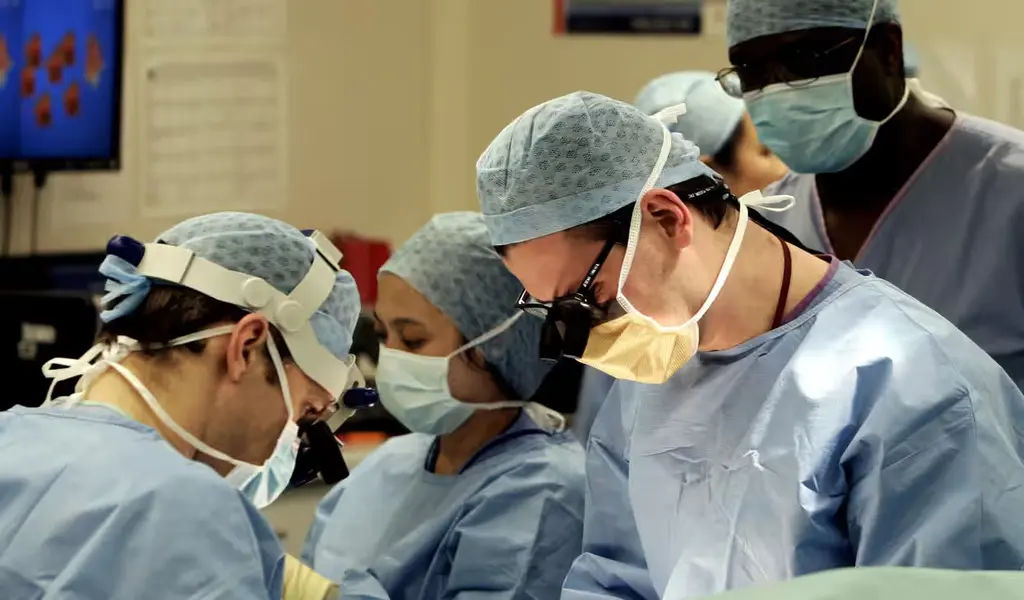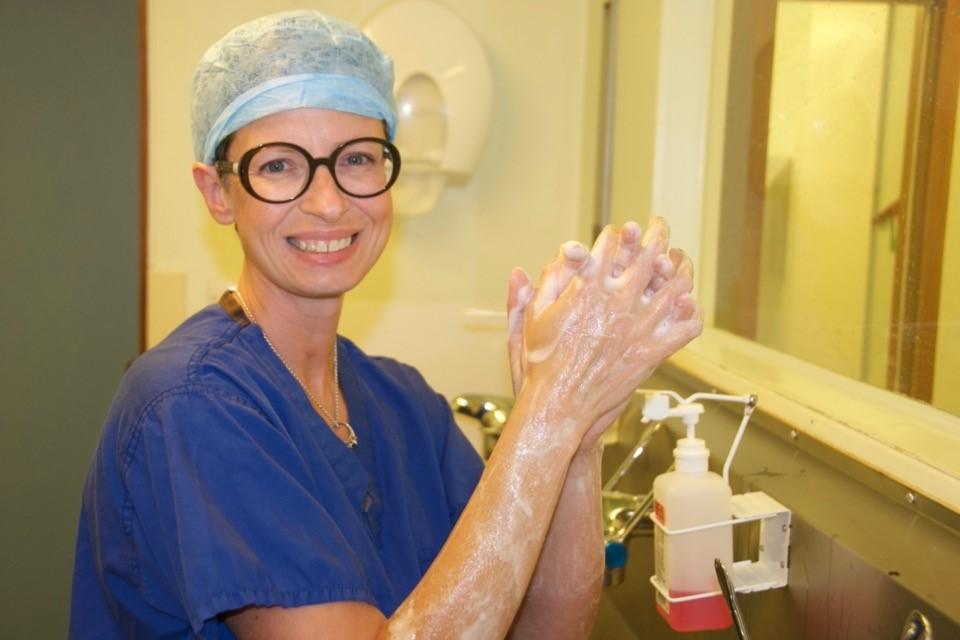News
Sexual Misconduct: Female NHS Surgeons Report Colleague Sexual Assault In Past Five Year

(CTN NEWS) – A recent comprehensive survey, the largest of its kind, has revealed that nearly one-third of female surgeons in the NHS have been subjected to sexual assault by their colleagues over the past five years.
This disturbing pattern of sexual misconduct within the profession often goes unaddressed, with potential repercussions for patient safety, according to a research paper to be published today in the British Journal of Surgery.
In a broader context, the survey highlights that two-thirds of women employed in surgery have encountered sexual harassment from colleagues within or near the operating theater.
Shockingly, the study also documented 11 reported cases of rape among participating surgeons.
These findings cast a spotlight on the hierarchical structures and lack of accountability prevalent in certain segments of the NHS.
The report underscores the pressing issue of sexual coercion, with 11% of female surgeons reporting instances of “forced physical contact linked to career opportunities.”
| TYPE | WOMEN – YES (%) | MEN – YES (%) |
|---|---|---|
| Harassment: composite | 89.5 | 81 |
| Jokes with sexual content | 89 | 80.6 |
| Displaying sexualized pictures | 29.7 | 19.9 |
| E-comms, unwanted/sexual | 26.2 | 16.1 |
| Physical advances, unwanted/sexual | 38.4 | 14.9 |
| Unwanted/sexual talk | 61.8 | 29.5 |
| Uninvited comments about body | 67.3 | 38.3 |
| Ask for a date despite previous refusal | 18 | 6 |
| Offered career opportunities for sex | 8.5 | 2.7 |
| Threatened for refusing sexual favour | 5.5 | 1.2 |
| Deliberately infringing body space | 44.9 | 17.8 |
| Assault: composite | 35.9 | 17.1 |
| Forced contact for career opportunities. | 16.6 | 2.9 |
| Touching, excluding genitals/breasts | 33.2 | 16.6 |
| Touching of genitals/breasts | 6.5 | 1.6 |
| Self-fondling by perpetrator | 1.3 | 0.3 |
| Rape: composite | 1.9 | 0.6 |
| Rape, workplace | 0.6 | 0.3 |
| Rape, other work contexts | 2 | 0.6 |
A ‘MeToo Moment’ in Surgery: Advocating for Cultural Transformation
In an op-ed piece for The Times, Tamzin Cuming, who serves as a consultant surgeon and chairs the Women in Surgery forum at the Royal College of Surgeons of England, characterizes the current situation as a pivotal “MeToo moment” for the field of surgery.
She advocates for a transformative shift in the healthcare culture.
This survey was commissioned by the independent Working Party on Sexual Misconduct in Surgery and received support from the Royal College of Surgeons, Health Education England, and the Association of Surgeons in Training.
The survey results have been presented to key stakeholders, including NHS England, the General Medical Council (GMC), the regulatory body for doctors, and the British Medical Association.
This extensive study stands as the largest of its kind ever conducted within the surgical profession. Researchers from the University of Exeter and the University of Surrey analyzed 1,436 responses from an anonymous online survey targeting surgeons.
Their stark conclusion is that “sexual misconduct is a frequent occurrence and often goes unaddressed within the surgical environment, primarily due to the deeply ingrained hierarchical structure and the existing gender and power imbalances.”
Alarming Prevalence of Workplace Sexual Misconduct Revealed: Implications for Patient Safety
Over the past five years, an alarming 90% of women and 81% of men have borne witness to various forms of sexual misconduct in their workplaces.
Shockingly, over 40% of women have endured unsolicited comments about their bodies from colleagues, while 29% have been subjected to unwanted physical advances, and 38% have had to endure inappropriate sexual banter at work.
A disheartening majority of female surgeons lack confidence in the ability of their NHS trust, the General Medical Council (GMC), or the Royal Colleges to safeguard their well-being.
The research paper highlights a grave concern that patient safety is being compromised due to the normalization of such sexual behaviors within and around operating theaters.
It asserts that individuals who target their colleagues with sexual misconduct are more likely to cross boundaries with patients, resulting in an unsafe working environment and a precarious space for patients.
This year, the Times Health Commission received accounts of sexual assault and harassment linked to a pervasive “boys’ club mentality” within the field of surgery.
The survey corroborates these findings, revealing that women in this male-dominated profession often experience and witness sexual misconduct to a greater degree. Currently, only 28% of surgeons are women.
Dame Jane Dacre, former president of the Royal College of Physicians and a member of the Times commission, attributes this widespread sexual misconduct to an outdated culture that alienates women.
She emphasizes how this culture erodes professional relationships and creates a workforce of fearful and distracted women, potentially leading to errors that compromise patient care.
Urgent Calls for Reform: Confronting Sexual Misconduct in Medical Practice
Professor Carrie Newlands, a consultant surgeon and one of the report’s authors, emphasizes the urgent need for reform in reporting and investigating sexual misconduct.
She stresses the importance of regulators, colleges, employers, and training authorities uniting to adopt a zero-tolerance approach, as the current system is clearly inadequate.
Tim Mitchell, president of the Royal College of Surgeons of England, vehemently condemns sexual harassment or assault in operating theaters and the broader NHS, describing the findings as truly shocking.
He calls for a critical assessment of sexual misconduct policies and procedures within NHS trusts and regulatory bodies.
Charlie Massey, chief executive of the GMC, underscores that updated professional standards for doctors unequivocally reject sexual misconduct, and the regulator views serious sexual misconduct as incompatible with registration.
The Department for Health and Social Care states its unequivocal stance against any form of sexual violence or misconduct in the NHS. They affirm their commitment to working closely with NHS leaders to eliminate such behavior, ensuring the safety of staff and patients.
The recently launched organizational sexual safety charter, developed in collaboration with royal colleges, staff, regulators, and trade unions, emphasizes a zero-tolerance approach to unwanted, inappropriate, and harmful sexual behaviors within the workplace.
Navigating Unwanted Advances: A Surgeon’s Ordeal in a Professional Setting
Philippa Jackson, a consultant plastic surgeon hailing from Bristol, found herself in a disconcerting situation while discussing a patient with a male colleague. In an unexpected and entirely inappropriate gesture, he approached her, aiming to offer a hug.
What followed was unsettling – he made unsettling noises and deliberately pressed his body against hers. As he withdrew, he callously remarked, “You probably felt my erection then,” and audaciously commented on the visibility down her top.
This encounter was an unsettling departure from the professional and sterile environment typically associated with a hospital, leaving Jackson momentarily unsure if she had accurately interpreted the situation.
Her immediate response was subdued; they were about to enter the operating theater, and she hadn’t fully grasped the gravity of the incident. She recalled thinking, “That’s creepy,” but it didn’t hinder her ability to perform her duties, so she soldiered on.
Later that day, circumstances placed Jackson back in the same colleague’s company for an emergency surgery. This time, his behavior escalated significantly.
While offering to secure her gown – a standard surgical procedure – he insinuated, “Now you’ve given me permission to tie you up under any circumstances,” and shockingly planted a kiss on her neck from behind.
Once again, they were on the brink of entering surgery, and she chose to suppress her discomfort. She described it as feeling trapped by the situation, not wanting to acknowledge her vulnerability.
Ultimately, Jackson decided to document the incident by reporting it to the hospital. However, her attempts at seeking justice were met with discouragement rather than support.
The hospital conducted a cursory investigation, focusing on questions like, “Did you say no? Did you push him away? Did anyone witness the incident?” The inquiry left her with the unsettling feeling that she was somehow at fault.
Shockingly, the male colleague faced no suspension or significant consequences for his actions. Shortly thereafter, Jackson decided to leave her position for a different job, explaining, “You survive, then move on to the next place and just hope it doesn’t happen again.”
This unfortunate experience sheds light on the challenges faced by individuals in similar situations and the pressing need for a safer and more supportive workplace environment.
Breaking Down Barriers: Challenges Faced by Female Surgeons in a Male-Dominated Field
Roshana Mehdian-Staffell, a trainee specializing in trauma and orthopedic surgery, has encountered a prevalent “boys’ club mentality” within her field.
One male doctor went as far as suggesting that a full-time surgical career was unsuitable for mothers, a notion she found both offensive and discouraging.
Mehdian-Staffell candidly shared her experiences of being subjected to sexual harassment on numerous occasions.
She recounted disturbing incidents where individuals entered the sluice room (where waste is disposed of) and inappropriately encroached upon her personal space, engaging in unwelcome physical contact.
On one occasion, a person entered the room and made a lewd comment about her attire, insinuating that she should always wear short trousers due to her supposedly “sexy” ankles.
Surgery remains one of the most male-dominated areas within the medical profession, despite the fact that women constitute more than half of medical school enrollments.
Shockingly, only 28 percent of surgeons are women, and this gender disparity becomes even more pronounced in senior positions, with a mere 15 percent of consultants being female.
The challenges faced by female trainees in surgery are significant, leading to high dropout rates. These trainees frequently rotate between different hospitals each year, creating difficulties in balancing their professional responsibilities with family life.
Additionally, the field often lacks flexibility, making it challenging for female surgeons to accommodate their personal needs.
Furthermore, female surgeons contend with elevated rates of miscarriage and infertility, adding to the physical and emotional toll of their careers.
Even the tools and equipment used in surgery are often designed with male proportions in mind, leading to practical difficulties for female surgeons.
Joanna Maggs, a consultant orthopedic surgeon in Devon, shared her experience of having to balance on a stool during certain surgical procedures because the operating tables do not lower sufficiently for her stature.
This inadequate equipment height can pose safety concerns, especially when using large power tools.
These challenges underline the pressing need for greater gender equality and support within the surgical field, ensuring that women are not only encouraged to pursue careers in surgery but also provided with the necessary resources and accommodations to thrive in this demanding profession.
RELATED CTN NEWS:
Canada Truck Attack: Landmark Trial Begins For Accused In Hate-Motivated Murder Of Muslim Family
India vs. Bharat: Supreme Court Rulings And Constituent Assembly Debates | Explained
U.S. Citizens Gather To Commemorate 22nd Anniversary Of 9/11 Across The Nation































